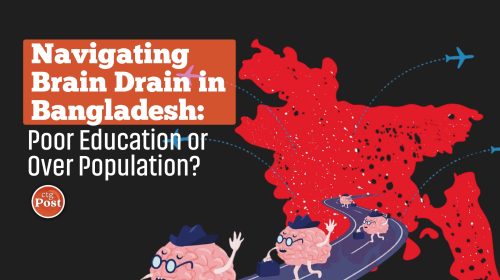Bangladesh is currently witnessing a significant trend in brain drain, with 42% of students opting to pursue education abroad. This phenomenon has sparked debates regarding the root causes, with some attributing it to a perceived poor education system, while others argue that the sheer population size and its implications on employment opportunities are the primary culprits. This report delves into the intricate relationship between the education system, population dynamics, and their collective impact on the brain drain phenomenon in Bangladesh.
While Bangladesh is home to a myriad of well-established educational institutions, concerns persist regarding the quality of education. On one hand, the nation has made commendable progress in curriculum development and infrastructure. Yet, outdated curricula and a perceived lack of emphasis on practical skills raise eyebrows. The absence of robust research opportunities and reliance on traditional teaching methods add nuances to the overall learning experience, prompting some students to explore educational avenues abroad.
The elephant in the room is Bangladesh’s remarkable population growth, characterized by one of the highest population densities globally. This demographic reality contributes to fierce competition for resources, infrastructure, and most notably, employment opportunities. Recent graduates find themselves entangled in a job market struggling to absorb the influx of qualified individuals, laying the groundwork for frustration and the allure of seeking opportunities on foreign shores.
Population Pressure: Adding Fuel to the Fire
Bangladesh’s population, exceeding 170 million, creates immense pressure on resources, including education and job opportunities. With limited positions available for a vast pool of graduates, competition intensifies, leaving many feeling underemployed or frustrated with their career trajectories. This fuels aspirations for migration, seen as a path to securing higher wages and improved living standards.
A closer look at the motivations driving students abroad unveils a desire for global exposure and a diverse learning environment. Studying abroad is seen not as an escape from a flawed education system but as an avenue to broaden horizons and access a more globalized education. Moreover, the pursuit of research and innovation, constrained by limited opportunities domestically, acts as a magnetic force propelling students toward institutions abroad renowned for their emphasis on these aspects.
The journey of studying abroad is not without its challenges. Financial constraints, stemming from high tuition fees, living expenses, and currency exchange rates, cast shadows on the dreams of many. Cultural adjustment becomes a formidable task, demanding resilience in adapting to new surroundings, climates, and lifestyles. Visa and immigration processes, marked by their complexity, introduce a layer of uncertainty, adding to the already intricate tapestry of studying overseas.
The brain drain phenomenon in Bangladesh is a multi-faceted issue, influenced by both the perceived shortcomings of the education system and the challenges stemming from population dynamics. A comprehensive approach to addressing brain drain must involve not only educational reforms but also initiatives to manage population growth and create a more robust domestic job market. Balancing the quality of education, research opportunities, and employment prospects is essential for retaining talent within the country and fostering sustainable growth. Brain drain in Bangladesh is a complex issue, driven by a confluence of factors beyond just the education system or population pressure. While both play significant roles, a comprehensive solution requires tackling both simultaneously. By investing in education reform, managing population growth, and fostering a conducive environment, Bangladesh can stem the tide of brain drain and harness its talented individuals for its own progress and prosperity.





















